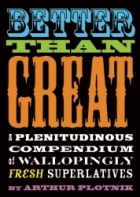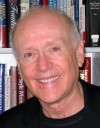Interview with Arthur Plotnik, author of Better Than Great: A Plentitudinous Compendium of Wallopingly Fresh Superlatives
 PBR: What gave you the inspiration to write a book about words?
PBR: What gave you the inspiration to write a book about words?
Arthur: The mojo of words gave it to me. The beguiling power of a good word well delivered. Parade a vivacious word before me and I succumb to it like a fool in love, doing crazy things like launching a two-or-three-year book project for the marginal but precious audience of language-lovers.
But repugnance, too, can be motivating; and just as I’m attracted to animated words I’m repelled by the relentless use of lifeless ones—in particular, walking-dead superlatives like awesome and amazing, our habitual terms for describing the extraordinary. I began my research for Better Than Great believing that thousands of better superlatives had to be available for celebrating the best things in our lives. I wanted to give myself and others these alternatives— put the mojo back in praise and acclaim.
PBR: How did you approach creating this reference guide?
Arthur: I rampaged through thesauruses, slang dictionaries, offbeat glossaries, Internet word lists, literature and journalism, gathering anything that might make a fresh-sounding alternative to tired ol’ great. I sought existing but not overused terms such as incantatory and exalting; and terms I might tweak into fresh formations: amen-astonishing, mind-marmalizing (turning into marmalade), tweetworthy. I winnowed about 7,000 entries down to 5,800, sorted ’em, and wrote some larky (merry, playful) text on the varied, cockahooping uses of superlatives.
PBR: Was there a specific rationale for writing Better Than Great as you did; broken down by emotion versus a more simple format of alphabetically listing words with definitions?
Arthur: Thinking about how they might be used, I organized the terms by intent: Do you want to acclaim something as joy-giving (e.g., rapturous), forceful (eviscerating), beautiful (enshrinable), large (Godzillian), trendy (snappydap), cool (shibby), or delicious (nectareous)? And so on, through fifteen emotion-oozing categories. Within each the terms are alphabetized and, when head-scratchingly uncommon, defined. The book is akin to a concept-oriented specialized thesaurus, you might say—if you wanted to bore someone.
PBR: Do you use some of your wallopingly fresh superlatives in your everyday language?
Arthur: I do, mostly by preference but sometimes just to avoid using awesome and its weary ilk. In conversation, depending on audience (always a factor) I might use conventional alternatives like striking and astonishing, more adventurous ones such as preternatural and coruscating, or playful choices like high-fiveable and aneurism-inducingly funny. In writing—including e-mails and greeting cards—I open the book and go for broke, wishing friends, say, a “spumescently brilliant, clangorously joyful, soul-schvitzing, jollified holiday and nirvanic New Year’s.”
PBR: How do people react to that?
Arthur: Readers seem to relish the force, surprise, and charged meanings of fresh superlatives. People read, after all, for stimulation. Some e-mail correspondents try to outdo me.
Listeners appear to be tickled by the effort, or refreshed by the break in generic drone. I feel more persuasive when I praise a dish as “eye-mistingly exquisite” rather than “really amazing.” Of course a few listeners are gobsmacked. Some say things like “I’m afraid to use regular words around you,” which distresses me because I’m too bumbling myself in language to be a snob or a scold. I’m simply offering fresh suggestions to anyone who feels boxed in by common vocabulary, as I often do. But, hey, use whatever works for you in expressing your thoughts and enthusiasms. Notice I say “what works,” not “what’s comfortable.” Expressiveness is always risky, but the reward is being heard for a change.
PBR: You have a very impressive writing background and a number of successful books under your belt. What got you started in your career of writing?
Arthur: It probably began in third grade, when a class essay made the “Junior Page” of the town newspaper. Someone —I think my well-meaning mother—gave it a rave, and I’ve never stopped writing since. The Iowa Writers Workshop helped me feel like a writer, and journalism sharpened the eye. But it was my editing career that taught me the Tao of revision, or put me on the true path to any writing success. Good writing is bad writing edited until it’s good. That’s the mantra.
PBR: What is your biggest joy in these accomplishments?
Arthur: When an article or book comes out, there’s that flicker of pride, maybe a sweet rush of feedback before the first nasty review. I’m profoundly cheered when readers find a work useful. But I agree with E. L. Doctorow’s notion of reward: “The book gives you the gift.” The writing itself. Nailing a concept, an image, a character in words? Pure yumness! Polishing a draft to a high shine? Ecstasiating! Knowing you can still make a verbal leap when your knees say ‘no way, bro’ ‘? Kickass!
PBR: Any regrets?
Arthur: Well, I didn’t give up everything and move to a Parisian garret to labor at intense works of fiction leading to big literary props. You know, I coulda had class. I coulda been a contender. I could’ve been somebody, instead of a (nonfiction) bum. I’ve had a taste of publishing fiction— a heap of pseudonymous potboilers in my youth, a literary story here and there still. It’s enough. I’m lucky to have done what I’ve done, had whom I’ve had to love.
PBR: Do you get any flack from writing professionals on your unconventional use of created words?
Arthur: No. If there are such inhospitable sticklers out there, I’m not in their crosshairs. They’ve got James Joyce to contend with first.
PBR: What’s next for you?
Arthur: On request of my publisher, the ebullient Viva Editions of Berkeley, I’ve just revised, updated, and expanded an earlier book—a personal favorite: The Elements of Expression: Putting Thoughts into Words. You wanna be expressive? It’ll be out in spring, as Zeitgeisty as Lady Gaga’s raw-meat gown.
Read our review of Better Than Great at: https://portlandbookreview.com/better-than-great-a-plenitudinous-compendium-of-wallopingly-fresh-superlatives/
 Arthur Plotnik is a versatile author with a distinguished background in editing and publishing. Among his seven previous books (not to mention 22 pseudonymous potboilers penned early in his career) are The Elements of Editing and The Elements of Expression, both Book-of-the-Month Club selections, The Elements of Authorship, and the bestselling writer’s guide, Spunk & Bite.
Arthur Plotnik is a versatile author with a distinguished background in editing and publishing. Among his seven previous books (not to mention 22 pseudonymous potboilers penned early in his career) are The Elements of Editing and The Elements of Expression, both Book-of-the-Month Club selections, The Elements of Authorship, and the bestselling writer’s guide, Spunk & Bite.
Plotnik studied under Philip Roth at the Iowa Writers Workshop, was a reporter for the Albany (N.Y.) Times-Union, and, after earning a second graduate degree, worked as a Library of Congress staffer in Washington and magazine editor in New York. He received numerous honors and awards as a long-time editor and publisher with the American Library Association in Chicago. He lives in that city today with his wife and an “avalanchine” heap of superlatives gathered for Better than Great. Please visit him at www.freshsuperlatives.com.
